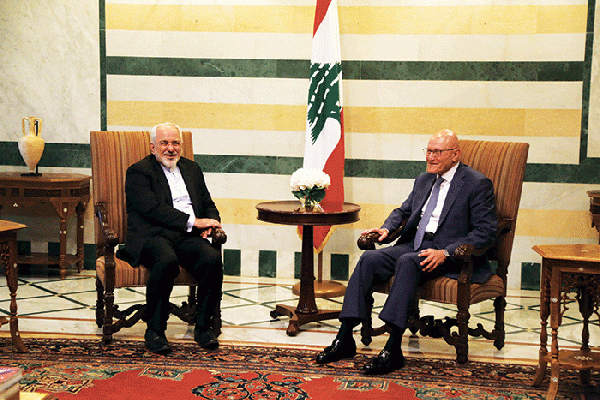
|
| Iran’s Foreign Minister Mohammad Javad Zarif (L) talks with Lebanon’s Prime Minister Tammam Salam at the Government Palace in Beirut, Aug. 11. |
The Iranian nuclear deal is echoing through the halls of diplomacy in the Middle East. Iranian Foreign Minister Mohammad Javad Zarif has visited Beirut and Damascus, introducing a road map to end the Syrian crisis with a united front against terrorism.
This Iranian initiative is supported by Russia and accepted by Syrian President Bashar Assad. The plan suggests a transitional period. The fight between the regime and the rebels, a proxy conflict between Iran and Russia on one side and the United States and its Gulf allies on the other, would turn into a joint battle against ISIS extremists.
Simultaneously, a national unity government, with representatives from the government and the opposition, would be formed. The Syrian constitution would be amended to endure the protection of religious and ethnic minorities. Lastly, internationally monitored presidential elections would be held to complete the transition into democracy.
With the utter failure of the U.S. campaign against ISIS and its inability to stop the advances of the group— let alone destroy it, the Iranian/Russian plan is a logical choice to both fight extremists and end the civil war. The frightening monster of terrorism makes cooperation— despite mistrust— a requirement to defeat ISIS.
We have witnessed glimpses of that cooperation in the coordination between the United State and pro-Iranian militias fighting extremists in Iraq. Although those efforts were never acknowledged publicly, Hashed Sha’bi paramilitary forces are fighting alongside the Iraqi army, which is supported by American air strikes.
The Iranian nuclear deal will allow Zarif, who is a skilled diplomat, to tour world capitals and present this plan for Syria, which was originally suggested by the Russians. Iran is now a legitimate power on the international stage.
FARS, the official Iranian news agency, revealed the details of the plan and reported that it has been discussed with Turkey, Egypt and Qatar.
The four-step plan seems sensible. But challenges remain.
Saudi Arabia loathes the Syrian regime. It will be hard to get the wealthy monarchy in the same coalition as Syrian forces. Moreover, Turkey and Gulf monarchies— particularly Saudi Arabia and Qatar— are guilty of funding and supporting terrorist groups in Syria.
ISIS aside, the anti-government forces in Syria are fragmented. There are dozens of major armed groups, half of them adopt a Jihadist ideology that is not too far from that of ISIS. Many so called “moderate rebels” are allied with al-Qaeda’s Nusra Front. Even if political opposition leaders agree to a deal, it will be difficult to enforce it on the ground.
Syrian state-run TV quoted Zarif after talks with Assad as saying their discussion focused on ways of ending the Syrian crisis.
“It is time for the other players and our neighbors to take note of reality, listen to the demands of the Syrian people and work for combating extremism and terrorism,” Zarif said, referring to Gulf Arab countries that back Syrian rebels.
Zarif also stressed the unity of Syria as a non-negotiable element of any agreement.
The Iranian stressed that any solution for the crisis should be “far from any foreign intervention and in a way that preserves the country’s territorial unity” and independence. He also underlined Iran’s determination to continue supporting Syria.
During his visit to Beirut, Zarif avoided talking about Syria. Instead, he urged the Lebanese to combat sectarianism and extremism.
It remains unclear if the nuclear agreement will prioritize diplomacy across the Middle East. But despite the promise of negotiations, wars are still raging in Syria, Yemen and Iraq.






Leave a Reply